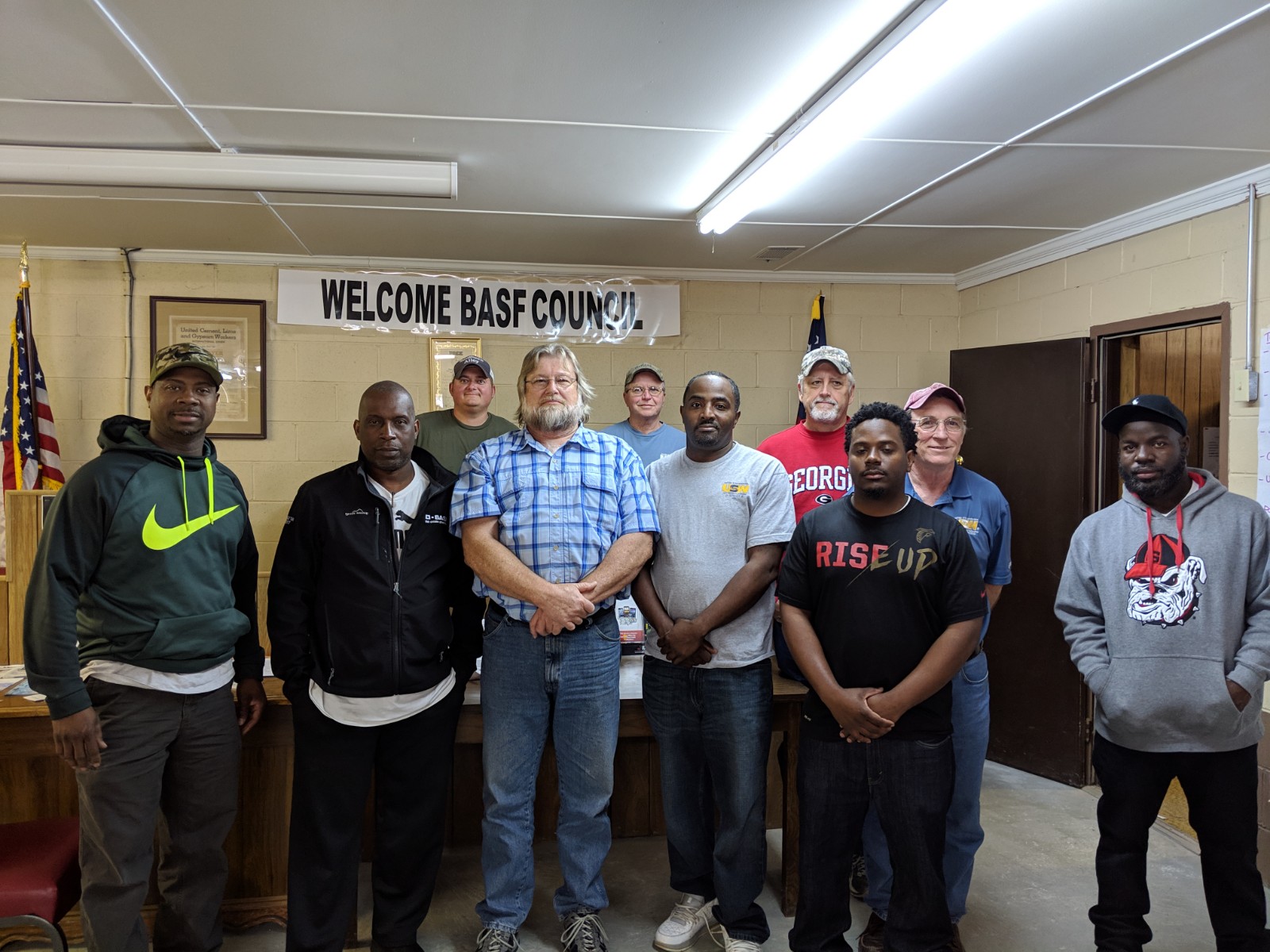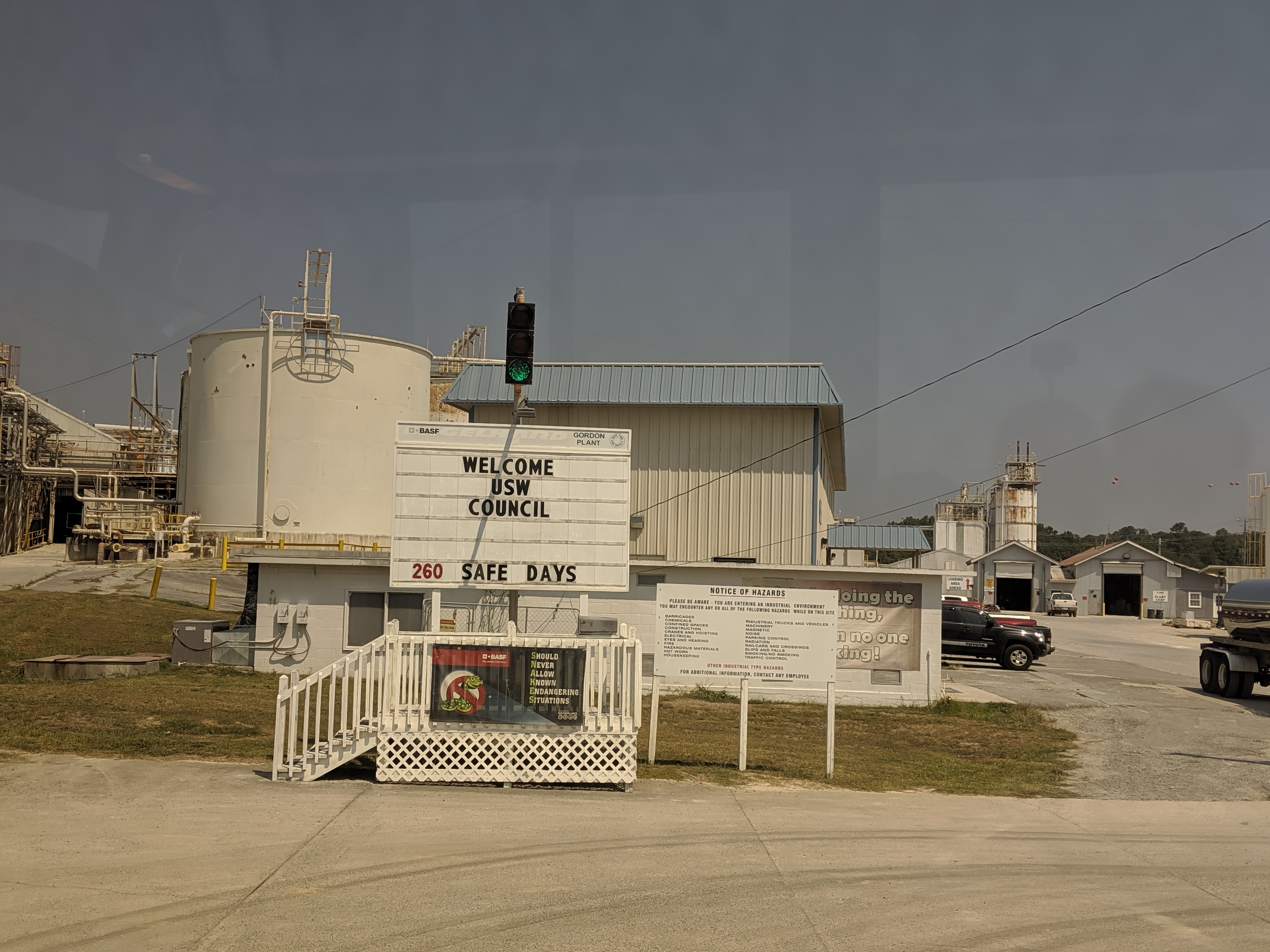By negotiating together, the three USW bargaining units at BASF’s Middle Georgia facilities pushed back the company’s demand for concessions and gained improved wages, benefits and contract language.
“This was the first time Locals 9-237 and 9-237-01 negotiated together with Local 9-233 as one big unit,” said Local 9-237 President Tommy Daniel. “We held the membership meetings together at the hall so everyone heard the same message. It showed the company negotiators that they were talking to one union. We stuck up for each other and the company knew it couldn’t split us apart.”

This solidarity enabled the Middle Georgia units to push back against BASF’s demand to lower the wages of all packaging job classifications. For example, BASF wanted to lock in employees hired after 2011 into a permanent entry level of pay. Thanks to the union, these workers can now bid to a job at a higher rate of pay.
In addition, if a worker in labor grades 8 or 10 bids to a higher paid job and there is a layoff, that person can return to their old position.
The three local units work in two locations in close proximity to each other in Middle Georgia where BASF mines kaolin, also called chalk, processes it and ships it. Kaolin is used in the paper industry to produce the gloss for magazines and as filler for pulp. This mineral also goes into the manufacture of tableware, medicines, makeup and catalytic converters for automobiles.
Locals 9-237, 9-237-01 and 9-233 represent 305 workers together who do jobs in operations, maintenance, electrical, packaging and the lab. Members of all three units ratified a four-year contract on Jan. 24, 2020 after overwhelmingly voting down BASF’s first proposal.
While some job duties are different for each of the units, all three will have the same wages, benefits and working conditions. The union negotiated wage increases of 2 percent for years one and two; 2.1 percent for years three and four. The company will pay an additional dollar per hour in years three and four of the contract for two jobs in packaging.
BASF will now contribute 3 percent of a worker’s total pay into his or her 401k, and will continue to match employees’ contributions to their 401k funds. Long-term disability pay is extended to two years, and funeral leave is extended from three days to five days.
Previously, new employees had to wait a year before receiving vacation time. Under the new agreement, they get three days of vacation after their 120-day probationary period. After eight years on the job, employees will stop receiving three extra days and get their regular vacation time outlined in the contract.
“We went through the entire contract book,” Daniel said. “Now, the contract book reflects what we are doing today. A lot of language and job classification changes were made. We also went through the Memorandum of Agreements (MOA), carried some forward and eliminated others.”
Difficult negotiations
“It was a very difficult contract to negotiate,” Daniel said. “The biggest reason was that everybody on the company side was new except for two or three people. We had to go through the contract, explain why we had each provision, where it came from, and how the union and the company worked hard to get this language,” he said.
“Negotiations weren’t looking good for a while. We tried to explain the packaging jobs, and told the company ‘these are the people who handle your product, and this is what your customer sees.’ We tried to let them know how important these jobs are to BASF’s success. The company wanted to compare the packaging jobs to nonunion, local warehouse jobs,” he said.
Eventually, USW District 9 Director Daniel Flippo and BASF Director for Labor Relations Robert Tokar had to step in and help the locals settle the contract, Daniel said.
“We have a BASF Council that played a large role in this bargain,” said USW District 9 Director Daniel Flippo. “Our relationship and success during this bargain is due to the strength and solidarity of our members and the power of Unity through the Council.”
Prior to negotiations, the three units prepared by getting Communications and Action Team (CAT) training from USW’s Strategic Campaigns department. Then, the locals implemented what they had learned.

Daniel said the CAT team gave members short bargaining updates after each day of negotiations, and placed them on union bulletin boards. Every Thursday, members wore the same union t-shirt to display solidarity.
With bargaining done, Daniel’s focus turns to monitoring the company’s adherence to the contract, and he has his hands full. He said the union has already filed a grievance over BASF’s prorating of the three extra vacation days for new hires.
“Now, we just have to get the company to follow the contract,” Daniel said.
